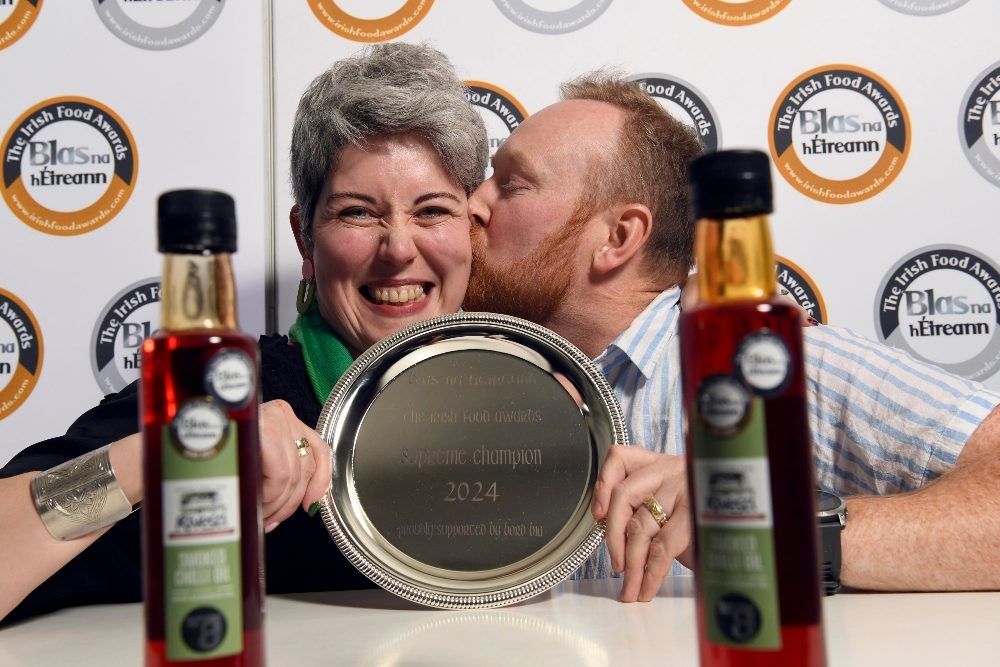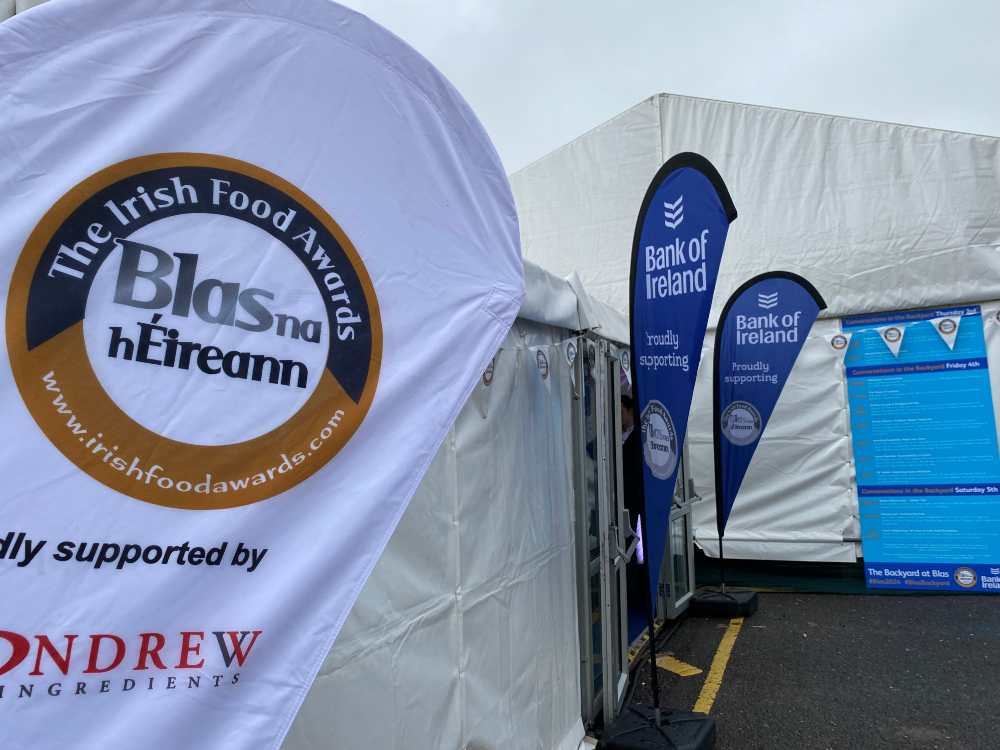In a special ThinkBusiness Podcast recording at the Backyard at Blas in Dingle, supported by Bank of Ireland, three artisan food producers reveal how quality, tradition and sustainability are driving growth in the Irish food sector.
As Storm Amy battered Dingle, three Irish food entrepreneurs gathered to discuss their journeys from kitchen experimentation to retail success.
Their stories, shared at the Blas na hÉireann Irish Food Awards, illustrate how Ireland’s artisan food sector is thriving by combining traditional methods with modern consumer demands for authenticity and sustainability.
“The main ethos is quality and consistency. That’s what our customers demand. You have to be consistent in what you produce, and you have to have that quality”
Eugene McKenna of Silver Hill Duck, Felix Oster of Mór Taste and Owen Mullins of Zanna Cookhouse represent different paths to the same destination: creating products that resonate with consumers seeking genuine, locally-produced food with clear provenance.
From family tradition to global recognition
Silver Hill Duck’s story begins in 1962, when the company was founded with a focus on developing a unique breed specifically for the Chinese restaurant market. “The company was formed by Ronnie and Lyla Steele and their backgrounds were within the industry,” McKenna explains. “They knew they had to produce something unique and special.”
The founders’ approach was methodical and customer-focused. “They went to the customer to find out what would be special, what was needed,” McKenna says. “The Chinese community were just moving into the UK at that time, establishing themselves in Chinatowns all over London, Birmingham, Liverpool.”
This market research paid dividends. The company developed what McKenna describes as “one of the best flavoured ducks” that became “the mother of all ducks” in Chinese cuisine. The turning point came when “chefs started looking for the name Silver Hill Duck” not just in the UK, but globally, including top Chinese restaurants in Singapore, France, Holland and Paris.
Personal necessity drives innovation
For Felix Oster of Mór Taste, the journey into food entrepreneurship began with a personal health challenge. Diagnosed as pre-diabetic a decade ago, he needed to monitor his sugar intake but found existing jam options inadequate.
“I started making jams that were actually more real fruit and much less sugar,” Oster explains. “For around seven, eight years, I just made it for my personal consumption, because it wasn’t available in the market.”
The transformation from personal project to commercial success occurred at Blas na hÉireann three years ago. “The real turning point was when the cherry jam won a gold medal,” he says. “Before that, I thought the product would be a compromise to people, because it’s reduced sweetness. Winning gold made me believe in the product even more.”
Today, Mór Taste products are available in most retailers across Ireland, representing what Oster calls “a crazy journey.”
Childhood foundations and collaborative growth
Owen Mullins of Zanna Cookhouse traces his food passion to childhood experiences. “I was 12, and I was milking cows by hand, using a stainless steel separator for separating the cream from the milk, churning a big wooden churn,” he recalls. “I think the foundation goes back to your childhood, goes back to the roots of who you are as an island nation, agricultural nation.”
The business achieved significant scale through strategic partnerships. In 2015, Dunnes Stores approached Zanna Cookhouse for their Simply Better range. The initial requirement seemed daunting: “In order to make it viable, we needed to get 80 cases on the pallet,” Mullins explains.
That modest beginning has grown substantially. “Now we’re producing 3,800 cases a week for Simply Better brand over 19 different varieties,” he says. The company now employs 52 people representing 14-15 different nationalities, embodying the diversity Mullins values in his operation.
Quality and consistency as core values
All three entrepreneurs emphasise similar principles in their operations. For McKenna, “the main ethos is quality and consistency. That’s what our customers demand. You have to be consistent in what you produce, and you have to have that quality.”
Oster focuses on natural ingredients and minimal processing. “I wanted to make a product that has as many natural ingredients as possible. I didn’t want to use any preservatives, any artificial colours, with reduced sugar content,” he explains. “It sounds simple, but in order to make it shelf stable, there’s a very specific process behind it.”
Mullins emphasises the importance of ingredient quality. “People very frequently ask me, how do you make them taste so good? My response is always the same. I don’t – I just put good ingredients in there. It’s about the ingredients. That’s where it’s really all at.”
Sustainability as a business imperative
Environmental responsibility features prominently in all three operations. Silver Hill Duck has achieved remarkable efficiency in resource utilization. “We’ve been very lucky to source a home for every part of the duck across the world,” McKenna explains. “There’s never waste or a byproduct – it can be a delicacy in other parts of the world.”
The company has invested in renewable energy, with solar panels meeting “approximately 35% of our energy needs.” Even waste materials find purpose: “Lesser grade duck fat we use for biodiesel, helping our carbon footprint.”
For Oster, sustainability extends to packaging design. “I use jars with straight lines inside, so you can easily scrape everything out, reducing food waste,” he explains. He also sources BPA-free lids from Germany, though he acknowledges the communication challenge: “I have so many messages to tell consumers – it’s about sugar reduction, natural ingredients, high fruit content. The sustainability message would be too much to communicate all at once.”
Zanna Cookhouse recently achieved Origin Green certification, Ireland’s sustainability programme for the food and drink industry.
Understanding consumer behaviour
The entrepreneurs have observed significant changes in consumer behavior. Oster notes a marked shift in shopping patterns: “A few years ago, I explained to people what was different about my products. Today, when I’m doing tastings, people pick up a product, turn it around, and read the label. That has become much more present behaviour with consumers.”
This aligns with broader trends toward transparency and clean labelling. As Mullins observes, “The consumer really is looking for a clean label product. They don’t want additives, preservatives, all the processing. We make products that taste and feel like you made them at home yourself.”
Challenges and opportunities ahead
Despite their success, the entrepreneurs identify ongoing challenges for Ireland’s artisan food sector. McKenna emphasises the importance of cultural understanding in export markets: “When we’re going to different countries and cultures, we need to understand the culture. You don’t go out there and tell them what you want to sell. You understand what’s acceptable and build relationships.”
Oster highlights the fundamental challenge of product differentiation: “Supermarket shelves are full of products and you need to stand out. The consumer has half a second of time to make a decision on what product to buy. Standing out on a busy supermarket shelf is absolutely necessary.”
For government support, the entrepreneurs advocate for continued backing of export initiatives and cultural education programs. However, Mullins emphasizes the importance of domestic support: “Help each other – that’s where it’s at. It’s about the public acknowledging the struggle that small producers have and supporting small producers.”
The broader context
These success stories reflect broader trends in Ireland’s food sector, where consumers increasingly value provenance, quality ingredients, and sustainable production methods.
The entrepreneurs’ experiences demonstrate how traditional food production methods, combined with modern business practices and sustainability focus, can create competitive advantages in both domestic and international markets.
Their emphasis on collaboration, quality, and authenticity provides a template for other producers seeking to navigate the complex landscape of modern food retail while maintaining the artisanal values that differentiate Irish products in global markets.
For Lucy Ryan, head of Food & Beverage Sector at Bank of Ireland said the three business, all Bank of Ireland customers, represent the diversity, creativity and quality of Ireland’s food sector.
“The diversity and creativity piece applies to all of them, from the healthier, fruitier jam, the quality quiches/pies to the distinctive hybrid duck that has huge export success.
“It’s great to be supporting these innovative operators across the island.”
-
Bank of Ireland is welcoming new customers every day – funding investments, working capital and expansions across multiple sectors. To learn more, click here
-
For support in challenging times, click here
-
Listen to the ThinkBusiness Podcast for business insights and inspiration. All episodes are here. You can also listen to the Podcast on:
-
Spotify
-
SoundCloud
-
Apple





